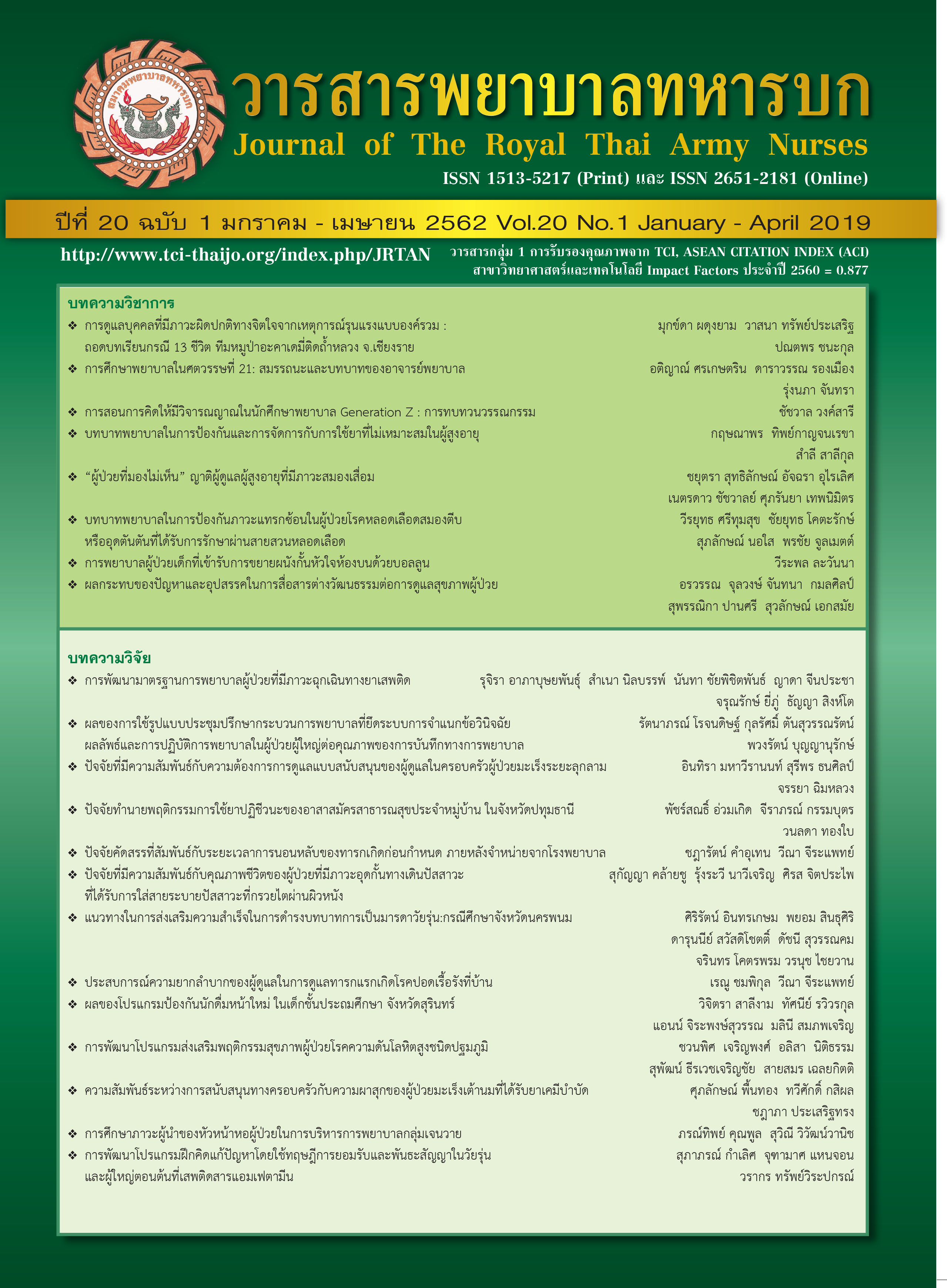Effects of Self-Efficacy and Survivorship Plan Enhancement Program in Acute Breast Cancer Survivors
Keywords:
Breast Cancer Survivors, Perceived Self-Efficacy, Survivorship PlanningAbstract
This study was quasi-experimental research with a two group pretest-posttest design aimed at assessing the effects of the self-efficacy and survivorship plan enhancement program in acute breast cancer survivors during treatment. The subjects were patients who had been diagnosed with breast cancer after surgical treatment. The subjects were monitored for post operation outcomes at Siriraj Breast Clinic, Siriraj Hospital. The first 32 subjects were purposively divided into a control group and the other 32 subjects were recruited as an experimental group. Data collection by the following tools: 1) a demographic data recording form, 2) a perceived self-efficacy questionnaire, and 3) a questionnaire on life planning for breast cancer survivors during treatment. Data were collected 2 times when patients came to the first visit after surgery and four weeks later. Data were analyzed by using descriptive statistics and variances between groups were compared with Paired t-test, Independent t-test and ANCOVA. According to the findings, posttest score of perceived self-efficacy and survival planning for acute breast cancer in the experimental group was significant higher than that of the control group (p < 0.00). Therefore, the finding from the study confirm the program should apply to acute breast cancer survivors for enhancing survivorship plan.
Downloads
References
Torre LA. Global cancer statistics, 2012. CA: A Cancer Journal for Clinicians. 2015;65(2): 87-108.
Hospital-Based Cancer Registry, 2012. National Cancer Institute in Thailand. 2016. (In Thai)
Hospital-Based Cancer Registry, 2016. National Cancer Institute in Thailand. 2018. (In Thai)
Peck S. Survivorship: A Concept Analysis. Nursing Forum. 2008;43(2):91-102.
Miller K, Merry B, Miller J. Seasons of survivorship revisited. The Cancer Journal. 2008;14(6): 369-74.
Twombly R. What’s in a Name: Who Is a Cancer Survivor? JNCI: Journal of the National Cancer Institute. 2004;96(19):1414-5.
Vitug AF, Newman LA. Complications in breast surgery. Surgical Clinics of North America. 2007;87(2):431-51.
Lacomba MT, del Moral OM, Zazo JLC, Gerwin RD, Goñí ÁZ. Incidence of myofascial pain syndrome in breast cancer surgery: a prospective study. The Clinical Journal of Pain. 2010; 26(4):320-5.
Basch E, Deal AM, Kris MG, Scher HI, Hudis CA, Sabbatini P, et al. Symptom Monitoring With Patient-Reported Outcomes During Routine Cancer Treatment: A Randomized Controlled Trial. J. Clin. Oncol. 2016;34(6):557-65.
Kim SH, Lee R, Lee KS. Symptoms and uncertainty in breast cancer survivors in Korea: differences by treatment trajectory. Journal of Clinical Nursing. 2012;21(7-8):1014-23.
Lueboonthavatchai P. Prevalence and psychosocial factors of anxiety and depression in breast cancer patients. Journal-Medical Association of Thailand. 2007;90(10):2164.
Segrin C, Badger T, Dorros SM, Meek P, Lopez AM. Interdependent anxiety and psychological distress in women with breast cancer and their partners. Psycho-Oncology. 2007;16(7):634-43.
Hilton BA. The relationship of uncertainty, control, commitment, and threat of recurrence to coping strategies used by women diagnosed with breast cancer. J. Behav. Med. 1989;12(1): 39-54.
Ho Thi Thuy Trang. Vietmames women with breast cancer. Journal of Nurses’ Association of Thailand, North-Eastern Divition. 2012;30(4): 30-9.
Chunlestkul K, Boontong T, Jitawatkul S, Sindhu S, Nilchaikovit T. Burapha University’s Journal. 2011;8(3):1-15. (In Thai)
Heebchinda. P. Sense of coherence, social support, and quality of life among patient with breast cancer post-treatment. Thai Cancer Journal. 2014;34(2):92-103. (In Thai)
Härtl K, Engel J, Herschbach P, Reinecker H, Sommer H, Friese K. Personality traits and psychosocial stress: quality of life over 2 years following breast cancer diagnosis and psychological impact factors. Psycho-Oncology. 2010;19(2):160-9.
Karayurt Ö, Uur Ö, Tuna A, Günüen N, Çıtak EA. The effect of personal counselling on anxiety, depression, quality of life and satisfaction in patients with breast cancer. The Journal of Breast Health. 2013;9(3):135-43.
Rojcheewin. P. The development of a clinical Nursing practice guideline to anxiety reduction in breast cancer patients before surgery. Thai Journal of Nursing. 2008;23(4): 26-40. (In Thai)
Chujai. M. The relationship between perceived self-efficacy in maintaining the quality of life for breast cancer patients after mastectomy [dissertation]. Bangkok: Mahidol University; 2009. (In Thai)
Peerawong. T. The way to negotiations towards the death of breast cancer patients. Thai Cancer Journal. 2015;35(1):32. (In Thai)
Siriraj Cancer Center. Siriraj Cancer Registry [Internet]. Faculty of Medicine Siriraj Hospital: Mahidol University; 2014 [cited 2016 Jun 11].
Siriraj Breast Clinic. The annual work load for Siriraj Breast Clinic Siriraj Hospital. Bangkok; 2013. (In Thai)
Downloads
Published
How to Cite
Issue
Section
License
บทความหรือข้อคิดเห็นใดใดที่ปรากฏในวารสารพยาบาลทหารบกเป็นวรรณกรรมของผู้เขียน ซึ่งบรรณาธิการหรือสมาคมพยาบาลทหารบก ไม่จำเป็นต้องเห็นด้วย
บทความที่ได้รับการตีพิมพ์เป็นลิขสิทธิ์ของวารสารพยาบาลทหารบก
The ideas and opinions expressed in the Journal of The Royal Thai Army Nurses are those of the authors and not necessarily those
of the editor or Royal Thai Army Nurses Association.






